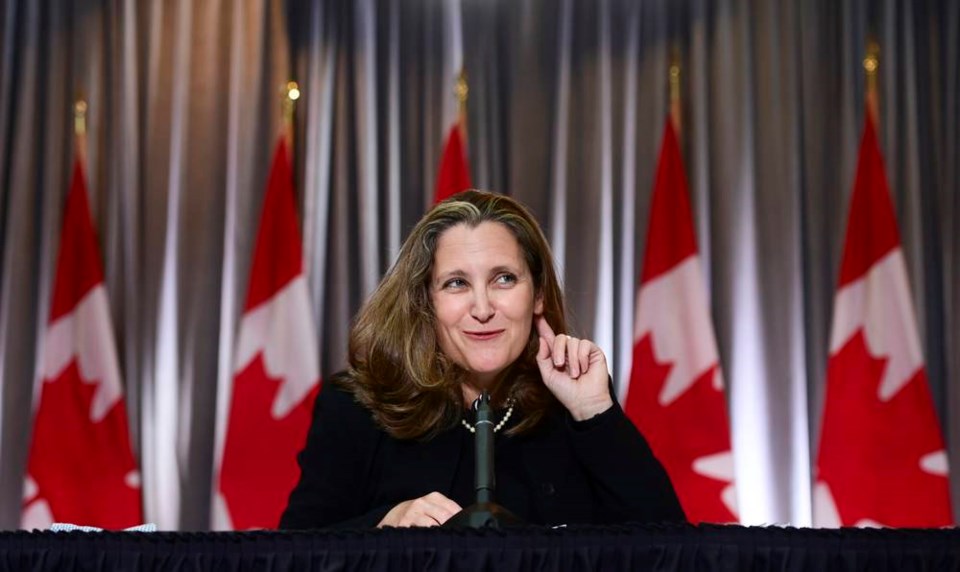Expansive, until the COVID-19 recession is over and economic growth is well entrenched.
Generous, because doing less will only hurt everyone in the long run.
And yes, we can afford it.
Chrystia Freeland’s staff billed her first big finance-minister vision speech this week as “an announcement of national significance,” and that was an overreach. She quite deliberately avoided talk of numbers or of setting firm parameters on government spending or deficits.
But in her speech and in a subsequent interview with the Toronto Star, she did set out some principles that will frame her decision-making as she navigates through the pandemic, and that will eventually have a great deal of influence on our lives as well.
If there was an announcement in her virtual speech to the Toronto Global Forum, it was that logic and compassion alike dictate big, fat government spending for a long time to come.
There is a moral case to be made for governments to spend and do “whatever it takes” to stamp out the virus and mitigate the damage for businesses and individuals alike, she said. But we knew that.
The point of her speech was to make a strong economic case for spending more, lots more, rather than less — not just because she’s (unashamedly) a bleeding-heart liberal but because the economic recovery depends on it.
In the interview, she laid out three distinct stages for fiscal policy. Right now, the effort is focused on controlling the virus and bridging individuals and companies to the other side with generous but time-limited support. Step two comes when we move beyond coping to repairing, when the government will dedicate “significant” money and programs to pushing the economy back to where it was and positioning it for the future.
And only in step three, when the recession is completely over, will the federal government begin to contemplate ratcheting back the spending.
She pointed to a consensus, not just in Canada but among economic thinkers at the International Monetary Fund and around the world, that austerity is all wrong. Curtailing government support while the recession is still with us would serve to undermine companies that are struggling through no fault of their own, and penalize people who have lost their livelihood because they happen to work in public-facing jobs.
And besides, with interest rates so low and the Bank of Canada indicating on Wednesday that they will stay that way for at least a couple of years, government borrowing is a bargain right now.
“The upshot is that we are living today in a world where the risks of fiscal inaction outweigh the risks of fiscal action. Doing too little is more dangerous and potentially more costly than doing too much,” Freeland said.
At some point, when the pandemic has been vanquished and the economy has fully recovered, there will be limits to government spending and a reinstatement of fiscal rules to rein in government largesse, she said. But for now, the focus of fiscal policy has to be on controlling contagion, supporting Canadian individuals and business, and making sure permanent damage is kept to a minimum.
But does it have to be all or nothing? Freeland presents it as a binary choice. It’s either government spending freely to prevent any permanent “scarring” from the recession — keeping all businesses open, finding jobs for everyone, keeping all the rent paid. Or it’s a “monstrous” and “heartless” fiscal policy that abandons people and companies for the sake of notional fiscal rules that date back to the bygone era of the 1990s when interest rates were high and inflation was more lively.
Not even Freeland’s most bitter political opponents argue in favour of chopping government support anytime soon. The political and economic debate in Canada is around the “how” — how should supports be designed to be efficient and impactful, who should take priority, and how strict the rules for eligibility should be. Those are debates worth having.
Even on the “how,” there’s a consensus among politicians and government institutions alike that low-income people and certain key industries such as airlines, accommodation and food services are repeatedly hammered by the pandemic and deserve special attention.
Far more controversial is the spending of the future — when and how the Liberals should impose some fiscal discipline, what kind of growth and recovery they should foster.
Conservatives tend to argue that borrowing on the assumption that low interest rates will stick around indefinitely is folly. Markets and economists want to see some kind of framework that will ensure good decisions and a sustainable fiscal path for the long term. Business groups urge government to impose a tight target for deficits and spending.
Prime Minister Justin Trudeau, however, says there’s way too much uncertainty in the economy to contemplate guidelines and restraints right now.
Freeland has talked extensively with all of them, but especially Trudeau. Her conclusion? Spending “needs to be limited and it needs to be temporary” over the long run, she says. But spending rules? Not quite yet.
That’s a choice that has little to do with logic or compassion, and everything to do with politics.
Heather Scoffield is a columnist with the Toronto Star.



